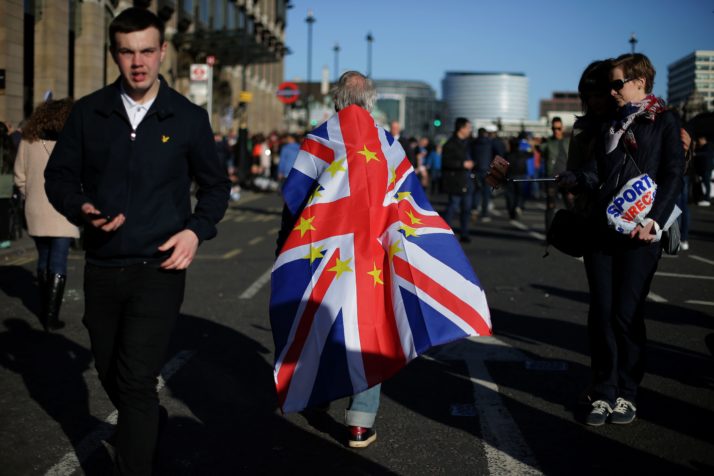
Date: 2025-01-15 Page is: DBtxt003.php txt00013289
UK / Brexit
Election fallout 2017
EU on UK: Brexit means Brexit ... There’s no readily available second chance for the British marriage with Europe.
Burgess COMMENTARY
Peter Burgess

Daniel Leal-Olivas/AFP via Getty Images
EU on UK: Brexit means Brexit ... There’s no readily available second chance for the British marriage with Europe.
As surprising as Britain’s election outcome was on Friday, both the humbled Conservatives and resurgent Labour agreed that Brexit must go on.
That’s probably for the best, since the alternative isn’t readily available.
Even if the U.K. did have a change of heart about Brexit — and under the British system only the current elected Parliament is sovereign and isn’t bound by whatever its predecessors decided — it looks both legally and politically challenging, to say the least, to stop the divorce process that began when Theresa May invoked Article 50 this spring and started the clock on a speedy exit from the EU within two years, down to the minute.
The message from legal experts, officials and politicians in Brussels is there’s no turning back on Brexit — except maybe through a humiliating climb-down of such historic proportions that it is all but impossible: A grovelling commitment not to make again for the EU door.
The lack of clarity on this point reflects the unprecedented nature of the entire Brexit exercise.
Article 50, eight sentences in the EU treaties that set out how a European country can untangle itself from economic and legal ties whose depth and complexity, has never been invoked before. And if Article 50 is remarkably vague on what happens during the the two-year exit process, it is wholly silent on whether a country that has set off down the exit path can, well, change its mind.
“It’s a chestnut of the debate,” said Alec Burnside, an EU lawyer with law firm Dechert. “In my view, it depends on whether there is a shared will for it to be done.”
Note the word “shared.”
“We don’t know when Brexit talks start. We know when they must end” — Donald Tusk
International law tends to say that the U.K. could reverse course unilaterally. “The [United Nations] convention on the law of treaties [says that] unless the treaties provide otherwise, a notification can be withdrawn,” according to Takis Tridimas, a professor of constitutional law and a lawyer.
It is also a matter of national sovereignty. “The right to withdraw from the EU is a sovereign right, and the other side of the coin is to change your mind. The crossing of the Rubicon occurs only when you leave. Until then you are a member of the EU,” Tridimas said.
That outcome would likely have to concur with the general EU spirit of more, not less, integration. That means it would likely be looked on favorably by national capitals and EU judges, subject to an important condition: No gaming the system.
The European Parliament warned against such a possibility. “A revocation … needs to be subject to conditions set by all [other EU countries], so that it cannot be used as a procedural device or abused in an attempt to improve on the current terms of the United Kingdom’s membership,” a resolution from April reads. By withdrawing and refiling down the road, the U.K. could seek better terms — and plunge Europe once again into uncertainty.
Alain Lamassoure, a senior French MEP aligned with French President Emmanuel Macron, argued the determining factor would be the existence of a “strong political will in London to withdraw Article 50 unconditionally.”
Would anyone be willing to give a commitment not to re-submit? “It would need a re-alignment of British politics to accept those terms,” said Burnside, the lawyer. “It would need a new general election.”
That is not inconceivable. But meanwhile the negotiations stopwatch continues to tick. The current deadline is end of March 2019, although it could be extended with the agreement of all European capitals.
There is one major problem: The end of March 2019 coincides with the next round of European Parliament elections and the selection of a new European Commission.
“It is unimaginable the U.K. elects new MEPs to the EP [and] there will not be another British commissioner,” said Lamassoure, the MEP. “That is non-negotiable.”
That position seems to have a wide support among the power circles in Brussels.
“We don’t know when Brexit talks start. We know when they must end,” tweeted Donald Tusk, president of the European Council, who speaks for national capitals.
“Do your best to avoid a ‘no deal’ as result of ‘no negotiations’,” was his friendly advice to the U.K.
Or was that a veiled threat?
For the moment, of course, the consensus in the U.K. remains in favor of Brexit. Prime Minister Theresa May, who said “Brexit means Brexit,” will seek to form a government, while Jeremy Corbyn, the leader of the Labour Party, told the BBC this morning: “[The negotiations] are going to have to go ahead.”
Yet the lesson from recent history in the U.K. seems to be: Expect the unexpected.
Authors:
Nicholas Hirst
Related stories on these topics:
Article 50BrexitUnited KingdomEuropean CommissionEuropean Council
British Prime Minister and Conservative Party leader Theresa May speaks at the declaration at the election count at the Magnet Leisure Centre in Maidenhead, England
ALSO ON POLITICO
5 takeaways from the UK election
CHARLIE COOPER
British Prime Minister Theresa May leaves the Conservative Party HQ in central London hours after the polls closed in the British general election
ALSO ON POLITICO
Theresa May clings on after UK returns a hung parliament
TOM MCTAGUE